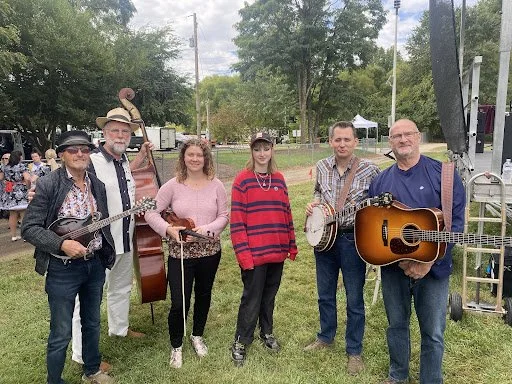Whitewater Bluegrass Company
Ursula Curlin | November 3, 2022
The fingerpicking of a banjo, the strumming of a guitar, the movement of a bow across a fiddle, the plucking of a mandolin and the soulful singing of a jam session create a warm, welcoming atmosphere of bluegrass music. The beat from the banjo, guitar, and mandolin becomes cohesive with the overlaying sound of the fiddle. The music brings comfort, breathes life into the air, and encourages people to dance.
Bluegrass brings people together to cherish the Appalachian culture and express themselves. Students on Warren Wilson’s campus are brought together in jam sessions and performances because of bluegrass.
To outsiders, bluegrass may be misunderstood as old country music for hillbillies. But the experience of bluegrass is meant to be enjoyed by everyone.
The assistant professor of music, Ben Krakauer noted that, “a lot of times people hear bluegrass, they think white people music, as far as who listens to it and where it's from.”
However, bluegrass has a diverse history of not only European settlers in the American mountains, but also of gospel and blues music from enslaved African people brought to the area.
“A lot of us who play it and teach it are really invested in trying to spread the message that this music is for anyone that wants to play it,” Krakauer said.
On Sept. 24, 2022, the Whitewater Bluegrass Company, containing two former Warren Wilson College (WWC) students, performed at Western Carolina University for Mountain Heritage Day.
Hundreds of people gathered together in appreciation of Appalachian culture by listening to live bluegrass performances, watching cloggers and supporting local craft vendors. The Whitewater Bluegrass Company members exhibited their strong friendships amongst the group when performing onstage with their gleeful stage presence and banter between songs.
The Whitewater Bluegrass Company is a working band, playing live music for special events, that has been led by WWC alumni “Uncle” Ted White for almost 40 consecutive years. As the heart of the band, White passionately rambles about his love for bluegrass music with a gentle, comforting voice. Reminiscent of Santa Claus, White stands about six feet tall with a well-trimmed white beard and a button-down shirt decorated with musical notes. He radiates glee on and off the stage, as a bass player, vocalist and uncle to all.
Whitewater Bluegrass Company with Ursula Curlin (center)
“The music to me has taken me places I would never, ever have gotten to go to in my life,” White said.
White has played music his entire life as a third-generation square-dance caller, but became more involved upon arriving at WWC because “there was always a jam session somewhere around those dorms.”
During “Uncle” Ted’s enrollment at Warren Wilson, David Holt had become the head of the Appalachian Studies program and founded the college’s first clogging team. Holt was able to get a sponsorship for the clogging team to tour England, Germany, Belgium and France, broadening the educational experiences of the students involved.
Although White was not originally supposed to be a part of the trip to Europe, a member of the team was unable to attend and White was able to join due to his abilities to call, play bass and play guitar from performing bluegrass.
As he reflected on how WWC enabled him to pursue bluegrass music as a career, White said, “I knew when I walked out the front door of Warren Wilson College that I could support myself in this world. That is a very, very strong feeling if your education can give you that.”
“Uncle” Ted graduated with a teaching certificate and a carpentry apprenticeship alongside the unique experiences he gained through bluegrass music. For White, attending WWC as a bluegrass musician was “a wonderful, very vibrant experience,” and “people were everywhere playing music.”
Molly Barrett, the current fiddler for the Whitewater Bluegrass Company also attended WWC as part of her college education before eventually transferring.
“I think the whole culture of it being in the mountains and experiencing a piece of that mountain life and heritage is just something that you really can’t get anywhere else,” Barrett said.
Part of the appeal of bluegrass to many people is its accessibility to new players. For people interested in learning to play bluegrass music at WWC, Krakauer stated, “you can borrow an instrument from the college, take an intro class per semester, learn some basic techniques or you can play a couple of songs. By the time you know four or five tunes or songs, you can play with other people.”
Being able to hold jam sessions with other bluegrass players cultivates a sense of community around this music culturally significant to the mountains.
“There is something very valuable specifically at Warren Wilson, there is something very enriching about studying bluegrass music and then being able to head into community events throughout the region,” Krakauer said.
Bluegrass has provided opportunities for students to connect with the local music community of the Asheville region, such as the Swannanoa Gathering.
For WWC students, bluegrass music can bring them a new sense of self and something to experiment with.
“I think in college it’s about exploring an identity or growing into an identity,” Krakauer said.
Bluegrass can provide a unique identity and connection to mountain culture for students interested in exploring different musical genres.
The future of bluegrass is promising as the scene embraces diversity and its legacy carries on in communities, including WWC. Krakauer is optimistic about the push for inclusivity in bluegrass.
“One thing that I just think is an exciting thing, the shift that’s happening, in that music scene, has been a lot of people working on what are the ways to make this music, and this music scene, more inclusive to people from a range of different identities,” Krakauer said.
Barrett agreed with this sentiment: “it’s more mainstream, with the masses accepting it and embracing it over the last 10 years.”


